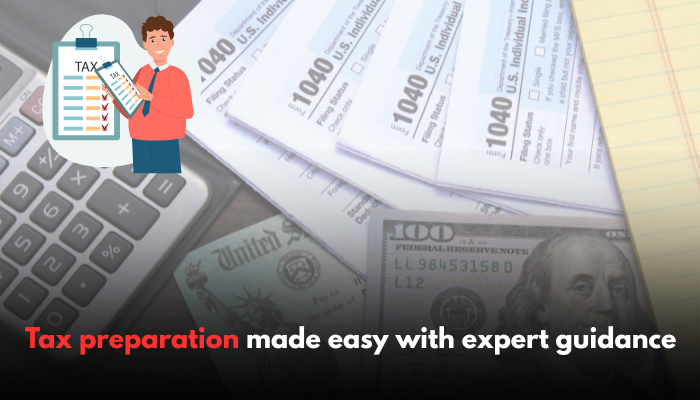Tax Preparation Made Easy with Expert Guidance
Preparing taxes doesn’t have to be stressful. Whether you’re an individual or a business owner, the process of organizing financial...

Preparing taxes doesn’t have to be stressful. Whether you’re an individual or a business owner, the process of organizing financial documents, understanding changing regulations, and filing accurately can feel overwhelming. But with the right strategy and a bit of expert insight tax preparation becomes far less daunting. In this post, we’ll break down key tips and expert-approved methods that simplify the process, save time, and help avoid costly mistakes.
Let’s dive into how you can approach tax preparation like a pro and ensure compliance while maximizing potential deductions.
1. Start Tax Preparation Early to Avoid Last-Minute Pressure
One of the biggest mistakes people make is delaying their tax preparation until the last moment. Procrastination not only causes stress but also increases the chance of missing out on deductions or making errors.
Starting early allows you to:
- Gather all financial documents at a steady pace
- Address discrepancies in forms like W-2s or 1099s
- Consult with a tax advisor without the rush
- Avoid late filing penalties
The sooner you start, the more control you’ll have over your filing process and tax outcomes.
2. Keep Your Financial Documents Organized Year-Round
Effective tax preparation begins long before tax season. Keeping your financial documents organized throughout the year is a simple but powerful habit that pays off.
Documents you should maintain include:
- Income records (W-2s, 1099s, interest income)
- Expense receipts, especially for itemized deductions
- Investment statements and retirement account contributions
- Business-related expenses (for freelancers and business owners)
Use digital tools or cloud-based storage to scan and categorize these files. Staying organized makes the actual filing process smoother and less error-prone.
3. Understand Which Tax Deductions and Credits Apply to You
One of the most valuable aspects of smart tax preparation is identifying deductions and credits you’re eligible for. Unfortunately, many people miss these benefits due to a lack of awareness.
Here are some commonly overlooked deductions and credits:
- Student loan interest
- Home office expenses
- Child and dependent care credit
- Retirement contribution credit
- Charitable donations
Understanding these can lower your taxable income or even increase your refund. An expert can guide you through eligibility and documentation requirements.
4. Use Reliable Tax Preparation Software or Tools
Technology has simplified tax preparation significantly. Whether you’re filing on your own or working alongside a professional, reliable software can reduce human error, offer audit protection, and ensure you’re compliant with current regulations.
Look for software that includes:
- Step-by-step guidance
- Automatic error checks
- IRS e-filing capabilities
- Secure data handling
- State tax integration
Some top-rated platforms also offer live support from certified professionals, giving you the best of both worlds automation and expertise.
5. Consider Your Filing Status Carefully
Your filing status affects your tax preparation more than you may realize. It determines your tax rate, standard deduction, and which credits you’re eligible for.
The five filing statuses are:
- Single
- Married Filing Jointly
- Married Filing Separately
- Head of Household
- Qualifying Widow(er)
Choosing the right status can significantly affect your tax liability. For example, some individuals filing as Head of Household may qualify for a higher standard deduction and lower tax rate than filing as Single.
6. Plan for Estimated Taxes If You’re Self-Employed
Self-employed individuals often overlook the importance of quarterly estimated taxes during their tax preparation. Failing to plan for these can lead to penalties and cash flow issues.
You should pay estimated taxes if you:
- Are a freelancer, consultant, or small business owner
- Have significant income not subject to withholding
- Expect to owe $1,000 or more in taxes
Use IRS Form 1040-ES to estimate your quarterly payments, and consider setting aside a dedicated percentage of each payment received throughout the year.
7. Know When to File an Extension (And How to Do It Right)
Not everyone can meet the tax deadline, and that’s okay as long as you file for an extension properly. Understanding how extensions work is a vital part of responsible tax preparation.
Key facts to keep in mind:
- File IRS Form 4868 to request a six-month extension
- An extension gives you more time to file, not to pay
- Interest and late-payment penalties still apply if you owe taxes
If you’re unable to gather all necessary documentation on time, filing an extension prevents the added burden of late filing penalties.
8. Be Aware of Tax Law Changes Every Year
Tax laws aren’t static they change due to new legislation, inflation adjustments, or government initiatives. Staying updated is critical to ensure your tax preparation reflects the latest rules.
Changes may impact:
- Standard deduction amounts
- Income tax brackets
- Credits like the Child Tax Credit or EITC
- Contribution limits to retirement plans
Follow updates on the IRS website or subscribe to a tax professional’s newsletter for timely updates that can affect your filing.
9. Work with a Certified Tax Professional for Complex Returns
If your financial life involves multiple income sources, investments, rental properties, or business ownership, your tax preparation may require more than just basic software.
A certified tax expert can:
- Ensure full compliance with federal and state laws
- Maximize eligible deductions and credits
- Help with strategic tax planning for future years
- Provide support during audits
Choosing a knowledgeable professional reduces the risk of errors and can even save you more money in the long run.
10. Keep Copies of Your Tax Returns and Records
After your tax preparation is complete, don’t forget to store your return and supporting documents. The IRS recommends keeping tax records for at least three years, though some circumstances may require longer.
Important reasons to keep copies:
- Documentation for audits or amendments
- Proof of income for loans or visas
- Tracking year-to-year financial trends
Store them digitally with encryption, or in a secure physical location if you prefer paper.
Thinking About Professional Help? Consider Outsourced Tax Preparation Services
If handling tax preparation in-house feels overwhelming, especially for businesses, consider working with outsourced tax preparation services. These services offer dedicated tax professionals who manage the entire process, ensuring accuracy, compliance, and efficiency.
Whether you’re an individual looking for peace of mind or a business aiming to reduce internal workload, outsourcing your tax prep can be a practical, cost-effective solution. Be sure to vet potential providers carefully look for firms with a solid track record, confidentiality agreements, and transparent pricing.
Wrap Up
Tax preparation doesn’t have to be confusing or stressful. By staying organized, understanding your financial responsibilities, and using the right tools or experts, you can take control of your taxes and even uncover opportunities to save. With these 10 expert-backed tips, you’re now equipped to tackle tax season with confidence and clarity.
If you’re exploring efficient ways to handle your taxes, especially for a growing business, it might be worth considering outsourced tax preparation services as a reliable, expert-driven option.
Browse this website for more informative articles-: www.thenewsus.com




